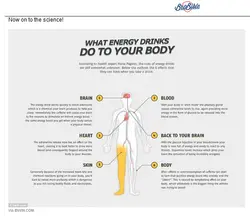CAFFEINE / ENERGY DRINKS
WHAT'S WRONG WITH CONSUMING CAFFEINE?
Caffeine is the most widely used drug worldwide. Caffeine is present in many common foods (pretty much anything with chocolate), making it easy to over-consume as well as coffee, fizzy drinks and energy drinks. When caffeine turns problematic is when it disrupts your life in a negative way, yet you're unable to stop consuming it. Or you consume it in amounts that are potentially dangerous to your health despite knowing that it may be harming you mentally or physically.
Caffeine addiction is the excessive and harmful use of caffeine over a period of time, such that it has negative effects on your health, social interactions, or other areas of your life.
WHAT ARE THE HEALTH RISKS?
Caffeine has various effects on the body that are potentially harmful to your health. There have been associations between caffeine with increased blood pressure and heart rhythm changes.
There is also a question of whether caffeine might be associated with increasing your risk of osteoporosis. One study found this to be the case for women in menopause with high caffeine intake.
Caffeine can also decrease your health by disturbing your sleep if it is consumed within six hours of bedtime. When you are sleep deprived, it makes it harder to function efficiently during the day. Sleep is also when your body heals, making it important for total health and even for immune function.
WHAT DOES A HEALTHY INTAKE LOOK LIKE?
The recommended daily amount of caffeine depends on a few things. If you’re an adult over the age of 18, and not pregnant, then the safe daily amount is up to 400mg per day (about four mugs of instant coffee or five mugs of tea). But, if you’re pregnant or breastfeeding, then the safe daily amount is reduced to 200mg per day.
Caffeine might affect children and teenagers more, or differently, than adults. In the UK, the recommended safe limit of caffeine in children and teenagers is 3mg/kg body weight, and it should only be consumed in moderation. For example, the safe limit for a healthy 10-year-old weighing 32kg would be 96mg of caffeine per day (two cups of weak tea).
WHAT ARE THE SIGNS OF HAVING TOO MUCH?
Caffeine is a stimulant, consuming too much can cause a cluster of symptoms associated with stimulation of the brain and nervous system. These symptoms include:
-
Dizziness
-
Feeling shaky
-
Headache
-
Increased blood pressure
-
Nervousness
-
Racing heart, or other heartbeat abnormalities
-
Sleep issues
As with all addictions, the pleasurable effects of caffeine can also sometimes mask other issues. Lack of energy and depression may underlie caffeine addiction. People may rely on caffeine to compensate for sleep disorders.
Caffeine intoxication produces symptoms that can easily be confused with anxiety disorders, such as panic attacks. Too much caffeine can also worsen symptoms of these disorders by intensifying feelings of worry, causing racing thoughts, increasing heart rate, and preventing relaxation and good-quality sleep.
People who are overstimulated with caffeine can also exhibit symptoms consistent with attention deficit disorders. Conversely, caffeine withdrawal shares similar symptoms with mood disorders.
WHAT CAN HELP?
'Self-help' tips don't solve the issue. However, they can help you/others feel more in control when experiencing strong emotions.
If you find that 'self-help' isn't enough, consider reaching out to a counsellor or your GP for help managing overwhelming emotions.
01
Assess your intake. Calculate how much caffeine you are consuming on a typical day. How many energy drinks do you have a day? How many coffees?
02
Pay attention to how you feel. Make a note of any side effects you experience after consuming caffeine. Also note any adverse effects you feel if you lower your normal intake or skip caffeine entirely. Pay attention to both mental and physical effects for a more complete picture of how you are impacted by its use.
03
Cut back gradually, over a number of days or weeks. Stopping too quickly can result in withdrawal symptoms, such as headaches, fatigue and irritability.
04
If you have insomnia or struggle to sleep well, avoid drinking caffeinated beverages late in the day or switch to decaf options.
05
Remember that caffeine isn’t just found in tea and coffee. It’s also found in lots of foods like chocolate and some fizzy drinks, as well as in some medicines.
06
Stay hydrated with other low or non-caffeinated drinks, such as water or green tea.
07
Think of the benefits. If you are drinking more than 3 caffeinated drinks per day, your health might be affected. In moderate doses, caffeine is healthy, but larger amounts can cause serious problems.
08
Giving up caffeine can be pretty stressful for your mind and body. You might experience withdrawal symptoms like anxiety or nervousness and headaches.[Make time to relax and remind yourself that these symptoms are temporary.
09
Get moving. exercise actually increases your energy and can be a healthy alternative for you if you’ve decided to quit caffeine.
10
Remember the positive benefits on your health of reducing your intake. If you are struggling with reducing this then seek help from your GP
EXTERNAL INFORMATION, SUPPORT AND ADVICE






















































 |  |  |
|---|---|---|
 |  |  |
 |  |  |
 |  |  |
 |  |  |
 |  |  |
 |  |  |
 |  |  |
 |  |  |
 |  |  |
 |  |  |
 |  |  |
 |  |  |
 |  |  |
 |  |  |
 |  |  |
 |  |  |
 |

